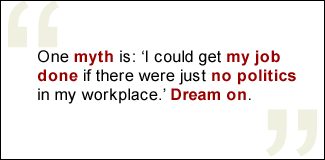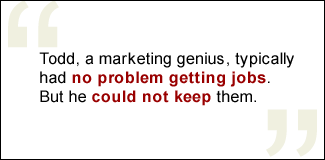We all know people who are brilliant but who just can't seem to get ahead or keep a job. Or people who, despite their many talents, never quite seem to understand how decisions are made in their workplaces, or how teams are formed, or how the dynamics of corporate cultures work. In other words, we know people who just don't have a grasp of what's usually -- and often pejoratively -- called office politics.
There is a widely held belief that those who get ahead in office politics must be dupes, stooges, or yes-people. In the world according to "Dilbert," those who ascend the corporate ladder are, by definition, incompetent.
 |
The reality, according to ║┌┴¤═° research, is quite different and is not good material for cynical cartoonists. In fact, ║┌┴¤═° has found that among the most successful organizations we have studied, many people who get ahead are solid performers, highly effective in their roles, and capable of handling increased responsibility. What's their secret? They use their innate talents, intentionally or instinctively, to rise through the ranks. What's more, many leverage their talents to understand and master the politics of their workplaces.
Dispelling myths
Before giving examples of how successful people use their talents to get ahead, let me first dispel a couple of corporate myths. The first is: "I could get my job done if there were just no politics in my workplace." Dream on -- no such workplace, or organization made up of humans, will ever exist. Either face this reality or prepare for lifelong frustration -- and unfulfilled potential -- at work.
"A keen sense of office politics can have a dramatic effect on our businesses and careers," says Susan RoAne in her article "Office Politics: Are You a Naysayer?" "People often complain about office politics, claiming, 'We just want to do our jobs well.' Let me share a timesaving technique: Waste not one moment lamenting about the horrible politics in your firm, company or association. There is no gathering of three or more persons that is free of politics."
The other prevailing myth is that politics aren't important if you just do a good job. Unfortunately, that's not the case. Many people fail at work because of their inability to deal with corporate politics, not because they lack the requisite skills to succeed in their jobs.
Online author Barbara Oaff says that experts define office politics as "the way in which workers recognize, and seek to reconcile, their competing interests." No matter the size of your company, country, or association, all politics are local. In other words, your team or workgroup's politics define who gets noticed and rewarded. Therefore, an initial step in mastering office politics is uncovering how things get done in your office.
This will take some detective work, and a good place to start is by interviewing people who are viewed as successful in your organization. The descriptions that these folks give you about the culture, pitfalls, and overall view of the organization will paint a very different picture than those of the average employee. It's likely that their descriptions will be laced with insights into the nature of the organization. During these conversations, be sure to ask questions such as these, then listen for recurrent factors:
- Do leaders like people who stay all night to get work done?
- Do folks who solve problems receive the greatest rewards?
- Are new ideas the ones that get noticed?
- Do people who put together great presentations usually get ahead?
- Is failure tolerated? What happened to the last person or project that failed?
- What types of work are rewarded?
- Who are the heroes and the scapegoats in the organization? Why?
- What gets the most "positive press"?
Based on the answers to questions such as these, you can formulate some strategies about -- and understand the nuances of -- what it will take to reach your goals.
Maximizing your talents
Once you've gotten a feel for the corporate landscape, the next important step is to understand and master your own greatest talents -- the ways in which you most naturally think, feel, and behave as a unique individual -- and apply them to the specific circumstances and politics of your workplace. The examples of Todd and Jane, both of whom had to confront and overcome corporate politics to succeed, show that it's possible to do just that.
Todd typically had no problem getting jobs. He was regarded by many colleagues as a marketing genius who was capable of increasing sales of any product and growing market share. But he could not keep a job. When Todd was brought into a company, he was usually given the mandate to turn things around and "make things happen." Unfortunately, in most companies, he did his job with such zeal that he alienated the people who would implement his strategies. He had no intuitive feel for politicking.
 |
When his last company's CEO asked for his resignation, Todd decided it was time for a change. Before accepting his current position, he took the Clifton StrengthsFinder, an online assessment that reveals people's top five themes of talent. He received coaching and applied what he learned as soon as he started his new job.
Before starting that job, Todd decided to use talents from two of his top five themes, Strategic and Futuristic, to plan how he would operate on his first day. When that day came, he gathered all of his new coworkers together and told them about his dominant, supporting, and lesser talents. He invited others to share theirs as well so he could understand how to best partner and leverage his colleagues' talents. He let them know that he was really interested in working with them to be the best. Todd was also blunt -- he admitted that he can come across as a know-it-all.
After he put all of this on the table, everyone understood where he was coming from, and Todd was able to concentrate on creating new strategies. He was able to use his Analytical and Strategic talents to put together innovative marketing plans. But he also knew that he wasn't usually effective at managing the hands-on implementation of his strategies, so he found partners who were good at that, something he had not done in the past. In this way, Todd realized, everyone would get some of the glory.
Todd has been with his current employer for four years -- this time, with nary a pink slip in sight. Since his arrival, his company has doubled its sales.
Jane, an advertising executive, faced different challenges. When she joined her current employer, she quickly realized some essential aspects of its political culture: It's a hard-charging, male-dominated firm that values outgoing people and managers and tends to pick as its leaders people who deliver the best presentations. The problem is that Jane is shy -- which meant the firm didn't initially think she would be a great manager -- and not a particularly good presenter.
What to do? Well, Jane knew from her experience and track record that she is, in fact, a very good manager, and when she joined the ad agency, she set about leveraging the talents that made her successful in the past. Jane -- who also took the Clifton StrengthsFinder and received coaching -- has Individualization and Harmony among her top five themes. People particularly talented in Individualization are intrigued with the unique qualities in each person. Jane learned how each person on her team at the agency operated, then managed each of them according to their own unique styles and talents. People especially talented in Harmony look for consensus, and Jane tapped that theme to ensure that the team worked together smoothly and didn't get stuck in conflict.
Even though the firm once thought Jane was too quiet to be a manager, her team's engagement has risen dramatically while turnover has plummeted, and revenues have more than doubled. She didn't try to transform her personality, but rather used the most powerful aspects of her unique nature to get the most from her team.
One more challenge
Jane was also determined not to let her unremarkable presentation abilities become a barrier to her success. Once she understood that the only way people at her agency are considered for leadership is by wowing executives and colleagues with impressive presentations about their projects, Jane decided that on every project she led, she would choose an outstanding presenter for her team. At the end of the project, she would rely on her Focus talents to work with this person to ensure that he or she was thoroughly prepared to give an outstanding presentation. Jane also made sure that the audience knew that she was the leader of the project by kicking off the presentation, then using her Individualization talents to reply to audience members' questions following the presentation. After leading successful projects and getting her team to deliver great presentations, Jane was quickly promoted.
As Todd and Jane's stories illustrate, you can master your office politics if you think of them, to some degree, as a game. Once you know the rules and are clear about what winning looks like for you, you can use your talents to put yourself in a position to win.